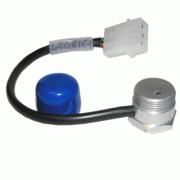 Modern aircraft sensors play a critical role in the flight economy and safety of the aircraft, its passengers and the cargo it carries. There are several types of sensors used in modern aircraft.
Modern aircraft sensors play a critical role in the flight economy and safety of the aircraft, its passengers and the cargo it carries. There are several types of sensors used in modern aircraft.
Temperature Sensors – As the name suggests, these are sensors used to measure the temperature of various engine components within the aircraft. Temperature sensors are usually used to record Cylinder Head Temperature (CHT), Exhaust Gas Temperature (EGT), Engine Oil Temperature (EOT), Fuel Temperature (FT), Hydraulic Fluid Temperature (HFT) etc.
These sensors usually work on the Resistance Temperature Detector (RTD) principle which essentially means that change in resistance (ohms) in a metal amalgam is directly proportional to temperature changes applied to it. So when an electrical current is passes through it, the change in resistance is calibrated and displayed as temperature of that particular component at the point where the sensor is placed.
Liquid Level Sensors – A liquid level sensor is generally mounted in thermowells and directly installed into reservoirs, tanks, sumps and gearboxes in the aircraft. These sensors are generally available as single point or multiple point interface elements or liquid levels and connected to onboard display units in the cockpit.
Flow Sensors – As the name suggests, a flow sensor is used to monitor the flow rate or any liquid be it aviation fuel or oil. The flow sensor is mounted within a thermowell and it might also contain an electronics unit that connects to a Aircraft Precision Products. The flow sensor is usually directly installed into pipe that carries the liquid for which the flow rate is being measured.
Pressure Sensors – A pressure sensor is used to measure pressure that is above or below a pre-set figure at the sensing location. The pressure sensor is directly installed into ducts, pipes, tanks, sumps, reservoirs or gearboxes in the aircraft. It can be specified to indicate either absolute or differential pressure.
Proximity Sensors – Proximity sensors are usually used to confirm the status of something that opens or closes e.g. doors, landing gear door, cargo bay door and so forth. It is also used to confirm if the landing gear is extended or retracted.
RPM Sensor – The aircraft spark plugs are powered by a mini power generator in the form of a Bendix Magneto generator. The Bendix Magneto is essentially a small generator with a transformer, breaker switch and a distributor to guide the high voltage to the spark plugs. It is important that this magnet rotate within the prescribed range and to confirm this, you need the Avionic Instruments which is a small cylindrical device that plugs into the magneto and provides a feedback to the RMP display unit in the cockpit.
Together, all these sensors provide critical information to the pilots and the pilots can either concentrate on flying when every reading is in the green or, take corrective action as required if one or more sensor provides abnormal feedback. The sensors therefore, have a direct bearing on the safety of the aircraft.

